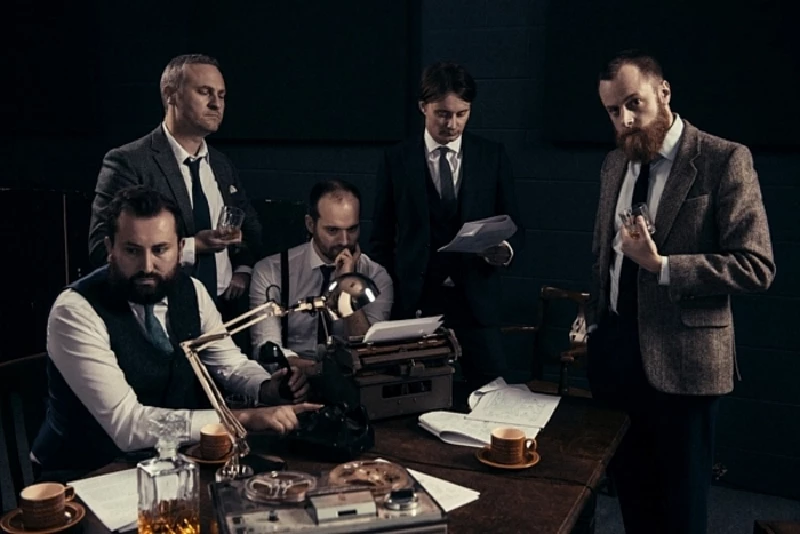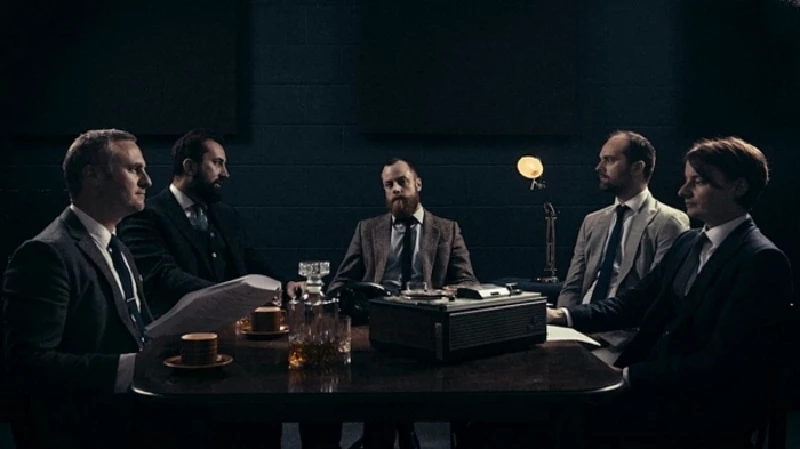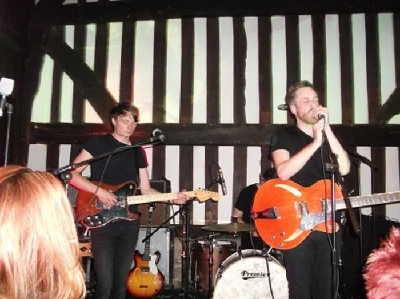I Like Trains - Interview
by John Clarkson
published: 9 / 9 / 2020

intro
John Clarkson talks to David Martin, the vocalist and guitarist with brooding Leeds band I Like Trains, about 'Kompromat', their first album in eight years, which examines the present political situation and the manipulation of reality by politicians.
Taking its name from the Russian term for compromising political material, ‘Kompromat’ is the first album in eight years from brooding Leeds band I Like Trains. The group have always taken an unflinchingly pessimistic view of society, and each of their albums have been themed. Their mini-debut album ‘Progress Reform’ (2007) and first album proper ‘Elegies to Lessons Learnt’ (2007), which were both released on the seminal indie label Beggar’s Banquet shortly before its collapse, told of tragic characters from the past and events from history and applied them to the present day. ‘He Who Saw the Deep’ (2010), the first of the group’s records to come out on their own I Like Trains Records, focused on the disastrous effects of climate change, and ‘The Shallows’ concentrated upon humankind’s over dependence and addiction to technology and mobile phones. With ‘Kompromat’, I Like Trains, which consists of David Martin (vocals/guitar), Guy Bannister (guitar/synths), Alastair Bowis (bass), Simon Fogal (drums) and Ian Jarrold (guitar), have targeted the increasing distorted version of reality and the truth that is being manufactured to the public by politicians and their spin doctors. ‘Kompromat’, which is being released on new German label Atlantic Curve, has more of a post-punk than a post-rock sound than I Like Trains’ previous records, and takes as its influences bands like the Birthday Party, Joy Division, the Fall, Gang of Four and the Velvet Underground. Its tracks include ‘A Steady Hand’, which has as its main inspiration Donald Trump, who, despite himself being from being from a first generation American family, still maintains a strong anti-immigration stance, and ‘Dig It’ which is about those in power who bend their own rules for their own ends and is particularly topical in light of recent events with Dominic Cummings. Six minute pivotal track ‘The Truth’ finds Martin in a long, powerful monologue listing all the ways in which the truth is reshaped (“The truth is not what we signed up for/The truth is no longer concerned with the facts”). The final song ‘Eyes to the Left’ is split into two parts, in which in the first half a robotic female voice describes a grim Machiavellian world and tries to sell it to us as a good thing, and in which in the second half Martin takes over the vocals and it concludes in a rush of white noise fury. Pennyblackmusic spoke to David Martin about ‘Kompromat’. PB: It has been eight years since ‘The Shallows’. Why has it taken so long for you to bring out this new album? DM: That is a good question, and the answer for it is two-fold. There have been all the practical issues for where we are in life with children, family, careers and things like that, which is the boring answer. On the flip side of that though there has never been a hiatus. We have been writing and working on this record during all that time. The thing which takes time to develop for an I Like Trains record is the concept which runs through the songs. The kick off point to that was the Edward Snowden/National Security Agency leaks, and that captured my imagination. I thought at first that I would be writing another record about information and personal data, a sort of extension of where we are at with 'The Shallows', just that insidious creep of data being used for marketing, who knew what about us and how careful were we with our information that we share publicly. And then over the next four or five years the concept of political manipulation and corruption became more and more central to what I was seeing, certainly with Brexit, and how data was manipulated and misinformation was utilised in order to sway members of the population over here. Then I followed through on that to American politics and revelations on the Cambridge Analytica stuff and how similar people were working on Trump’s campaign as they were with Brexit. The theme that I picked was developing all the time, and I didn’t have a narrative arc with 'Kompromat' until it all played out. PB: The truth is something that has always obsessed you. If you look back to the start of I Like Trains’ career and songs like the ‘Spencer Perceval’ single, that had an A and B side, one told from the viewpoint of the murderer and one told from the viewpoint of the victim. Do you see ‘Kompromat’ in some ways in its theme as the extension of that? DM: I do. Musically it is quite a departure from the early I Like Trains, but I guess if you look at in that way it is less of a jump. I have always felt that there were multiple sides to any given story. I have often tried to tackle that in my writing and if you look back again to ‘A Rook House for Bobby’, which was about the chess player Bobby Fischer and another early single, he was an even more complicated character than I first realised and that caused me to write another song called ‘Citizen’, which cast him in a slightly different light than the anti-hero of the first song we wrote. Life is messy. I know a lot of people like to see things in black and white and like to know what the truth is. It just feels to me that we are getting further way from things than ever, and being able to grasp what the truth is and what the facts are. In any given news cycle there is so much happening and, if you throw in social media as well, how do you draw a narrative between seemingly disconnected events that are actually connected and make sense of that somehow? PB: We are lied to on a daily basis by our politicians on the grandest of scales and we all know that we are being lied to. Donald Trump was on the news the other night, trying to put the American presidential election back from November making all sorts of excuses that he was being cheated because of the postal vote over there, but we all know that he is trying to cheat us. ‘Kompromat’ holds the internet and technology responsible for many of these lies. Would that be a fair assessment? DM: I don’t think politicians spreading disinformation is a new thing. If you look back in history you can recognise certain world leaders that you can draw parallels with there, although I do think that if you combine the ambition of someone like Trump with someone who knows what they are doing on the information technology side of things then that can be a very powerful thing. If you look as well, for example, at a lot of the people who facilitate the Republican Party, they are not challenging Trump. They know that a lot of what he says isn’t true, but if they toe the line they don’t have to believe it. If they say that they believe it or they turn a blind eye and refuse to condemn it, they rise through the ranks. You have got a lot of very mediocre politicians who have never been that high up in power rising through the ranks at the moment. If there are any of them with any moral compass, they will just fall out of the way. It is almost a way of recognising who is willing to fall on their sword for the president. PB: Who inspired the opening track ‘A Steady Hand’? That song focuses on nationalism. DM: My main focus on that one was Trump again and a lot of first/second generation Americans. They came over from Europe and made a new life for themselves, and there were all these native people over there that they cleared out. Yet there seems to be no recognition of the fact that Trump’s father was only one generation away from Germany. I think his great-grandfather was German and yet he has this fierce anti-immigration rhetoric. That has been played out again and again in various other places as well, but that was the initial driving point there. A lot of it was written also in the wake of the Brexit vote and what that uncovered as well. PB: ‘Dig In’ is about all those morally bankrupt people who wield all the real power despite never being voted for. You must have felt a sense of prophecy after the recent incident with Dominic Cummings in which he broke lockdown rules and got away with it. DM: (Laughs) We couldn’t have timed it any better. When you take eight years to write an album about current affairs, you worry if the world might have moved on. Are we releasing it at a moment when the rest of technology has taken over and moved to a better place? Then we launched it during a global pandemic, and a lot of politicians and Dominic Cummings in particular revealed that they believe that the rules don’t apply to them. He is not even a politician, but he believed the rules don’t apply to him or the ruling class basically. The general public has every right to be furious at the handling of the pandemic in the UK and also the US as well. All these conversations seem to act out on both sides of the Atlantic, but profit and personal interest has been put above human life over here, the irony being that if we had gone into lockdown earlier and had spent proper money on implementing a track and trace system we would be in a hell of a better situation. The economy would be in a better position, but also when you start to look at who has been awarded contracts under emergency protocol you realise that without a proper tender process their cronies or their mates have been awarded vast sums of money, even though they don’t have any background in the service or goods that they are providing. It is just pure and simple disaster capitalism. All I hope is that anger lasts until we get the chance to vote again, but four and a half years is a long time. PB: ‘The Truth’ seems to be what the rest of the album is building up to. Is it true that a large part of that was improvised in the studio? DM: Yes, I basically started writing a list of things on my phone, and I did that over a number of months. It is pretty much in chronological order. You can pick out parts of that which can relate directly to a news story of the day or something which someone said on social media, and I had this list which I didn’t really know what I was doing with at the time. Then we got towards the end of recording and the last two days in the studio and we were looking to pull together another track and I said, “Well, I do have this idea.” It felt ambitious but I thought that it could fall flat and thankfully the guys said, “Let’s try it.” So we just started working on the music, and we had part of the first section and the last section. I was just ad libbing this list on my telephone and I think we just captured it in the fourth take. It was very much flying by the seat of our pants really. PB: The last track ‘Eyes to the Left’ features a female vocal in its first half. Who is she? DM: That is Anika, Anika Henderson, who goes under the moniker of Anika. She is also the vocalist in Exploded View, who I would very much recommend checking out. PB: It is a song of two distinctive and very different halves. Were they originally written separately? DM: Yes, the first half was Guy working at home and messing around on his synthesizers, and we liked it but we didn’t really know where we went next with it. We took it into the studio and this was again during those last two days when we were working on ‘The Truth’. It was another one which came out at the end. Guy stayed out of it because he had already been tearing out his hair trying to work out where to go with it next, and then with Simon on drums and Alistair on bass and me playing synths which isn’t my first instrument we came up with that second half in the studio again and that ball of rage ending out of something more sedate in the first half. PB: ‘Kompromat’ focuses on dark themes and has a pessimistic world view yet is often very funny and witty in a black way and manages to be enormously entertaining. Was that your intention? DM: I think so. I am furious at the state of the world, but I am not under any illusions that writing a record will change that. If you are not going to cry then you might as well laugh, I suppose. At one stage the band was our entire lives, We wanted to do it for a career, but now we are older we want to do it for fun, so we might as well have fun doing it. We always had fun doing it but I wanted that to show through a little bit more. PB: You have been going since 2004. Why do you think you have lasted so long? DM: Sheer bloody-mindedness, I think (Laughs). We must enjoy it. It is certainly not for the money that we do it and it takes a lot of time, but it scratches an itch like nothing else does creating something of some cultural value. ‘PB: Last two questions. ‘ He Who Saw the Deep’, ‘The Shallows’ and ‘A Divorce Before Marriage’ were all released on your own I Like Records. Atlantic Curve is a new German label. Why did you decide to switch to them to release this record? DM: I work in music. I work at a record label, the Leaf Label in Leeds, as well. A lot of the admin and stress would have fallen to me and I didn’t have time, so I wanted to get a team together that was enthusiastic. That helps to have a team to shout about it rather than alone shouting, so I was on the look out for a label. It took a while for these guys to make themselves known to us at a show we did in Germany. I was actually getting to the point where I was thinking we would put it out on ILR again, but there is only so much that you can do, and so to have found another team of people to release it feels quite fortunate at this stage in our career. PB: You have done a lot less touring in recent years, preferring to concentrate on sporadic and occasional shows. When we get back to gigs, do you intend to play more shows or will you continue to be playing occasionally? DM: We would like to tour it but it would be fairly concentrated. We can’t go on the road for months on end. We will try to carve out a couple of weeks here and there, and do a little bit more than the odd show. That all remains to be seen. If we start selling things out and we ride some second wave of success (Laughs), we will keep playing until people are bored with us. PB: Thank you. 'Kompromat' is released on vinyl and CD on the 25th September.
Band Links:-
https://iliketrains.co.uk/https://www.facebook.com/iLiKETRAiNSmusic/
https://twitter.com/iLiKETRAiNS
Play in YouTube:-
Picture Gallery:-


interviews |
|
Interview (2014) |

|
| Anthony Strutt speaks to Leeds alternative rock band I Like Trains about their fascination with history and lengthy career |
| Interview (2012) |
live reviews |
|
Guildhall, Leicester, 19/10/2012 |

|
| Anthony Strutt finds post-rock bands I Like Trains and Her Name is Calla both on superb form as they play extended set at a show at the Guildhall in Leicester |
reviews |
|
The Shallows (2012) |

|
| Haunting third album from brooding Leeds-based post rock outfit, I Like Trains |
| Sirens (2011) |
| The Christmas Tree Ship EP (2008) |
most viewed articles
current edition
Carl Ewens - David Bowie 1964 to 1982 On Track: Every Album, Every SongArmory Show - Interview with Richard Jobson
John McKay - Interview
Colin Blunstone - Thalia Hall, Chicago, 16/7/2025
Billie Eilish - O2 Arena, London, 10/7/2025
Bathers - Photoscapes 1
Visor Fest - Valencia, Spain, 26/9/2025...27/9/2025
Loft - Interview
Sir Tim Rice - Interview
Robert Forster - Interview
previous editions
Manic Street Preachers - (Gig of a Lifetime) Millennium Stadium, Cardiff, December 1999Heavenly - P.U.N.K. Girl EP
Beautiful South - Ten Songs That Made Me Love...
Oasis - Oasis, Earl's Court, London, 1995
Peter Perrett - In Dreams Begin Responsibilities Interview Part One
Boomtown Rats - Ten Songs That Made Me Love....
Coldplay - Wembley Arena. London, 16/8/2022
Prolapse - Interview
Pixies - Ten Songs That Made Me Love...
Trudie Myerscough-Harris - Interview
most viewed reviews
current edition
Davey Woodward - Mumbo in the JumboSick Man of Europe - The Sick Man of Europe
Lucy Spraggan - Other Sides of the Moon
Amy Macdonald - Is This What You've Been Waiting For?
Phew, Erika Kobayashi,, Dieter Moebius - Radium Girls
Bush - I Beat Loneliness
Suzanne Vega - Flying With Angels
Alice Cooper - The Revenge of Alice Cooper
Cynthia Erivo - I Forgive You
Blueboy - 2
Pennyblackmusic Regular Contributors
Adrian Janes
Amanda J. Window
Andrew Twambley
Anthony Dhanendran
Benjamin Howarth
Cila Warncke
Daniel Cressey
Darren Aston
Dastardly
Dave Goodwin
Denzil Watson
Dominic B. Simpson
Eoghan Lyng
Fiona Hutchings
Harry Sherriff
Helen Tipping
Jamie Rowland
John Clarkson
Julie Cruickshank
Kimberly Bright
Lisa Torem
Maarten Schiethart